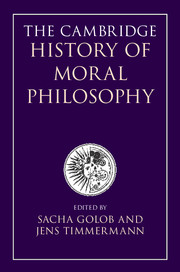Book contents
- The Cambridge History of Moral Philosophy
- The Cambridge History of Moral Philosophy
- Copyright page
- Contents
- Contributors
- Acknowledgements
- Introduction
- 1 Ethics before Socrates
- 2 Socrates and Sophists
- 3 Plato
- 4 Aristotle
- 5 Epicureanism and Hedonism
- 6 Stoicism
- 7 Ancient Skepticism
- 8 Neo-Platonism
- 9 Early Christian Ethics
- 10 Boethius, Abelard and Anselm
- 11 Medieval Jewish Ethics
- 12 Moral Philosophy in the Medieval Islamicate World
- 13 “Christian Aristotelianism”? Albert the Great and Thomas Aquinas
- 14 Duns Scotus and William of Ockham
- 15 Humanism
- 16 The Protestant Reformation
- 17 Descartes’s Provisional Morality
- 18 Hobbes
- 19 The Cambridge Platonists
- 20 Bayle
- 21 Leibniz
- 22 Spinoza
- 23 Pascal
- 24 Locke and Butler
- 25 Shaftesbury, Hutcheson and the Moral Sense
- 26 Hume
- 27 Smith and Bentham
- 28 Rousseau
- 29 Rationalism and Perfectionism
- 30 Kant
- 31 Fichte
- 32 Hegel
- 33 Mill
- 34 Schopenhauer
- 35 Kierkegaard
- 36 American Transcendentalism
- 37 Nietzsche
- 38 Marxism
- 39 Sidgwick
- 40 Pragmatism
- 41 British Idealism
- 42 Ethical Intuitionism
- 43 Husserl and Phenomenological Ethics
- 44 Ethics in Freudian and Post-Freudian Psychoanalysis
- 45 Noncognitivism: From the Vienna Circle to the Present Day
- 46 The Frankfurt School
- 47 Heidegger
- 48 Sartre
- 49 French Ethical Philosophy since the 1960s
- 50 Wittgenstein’s Ethics and Wittgensteinian Moral Philosophy
- 51 Anti-Theory: Anscombe, Foot and Williams
- 52 Discourse Ethics
- 53 Decision Theory
- 54 Rawls
- Index
- References
5 - Epicureanism and Hedonism
Published online by Cambridge University Press: 13 December 2017
- The Cambridge History of Moral Philosophy
- The Cambridge History of Moral Philosophy
- Copyright page
- Contents
- Contributors
- Acknowledgements
- Introduction
- 1 Ethics before Socrates
- 2 Socrates and Sophists
- 3 Plato
- 4 Aristotle
- 5 Epicureanism and Hedonism
- 6 Stoicism
- 7 Ancient Skepticism
- 8 Neo-Platonism
- 9 Early Christian Ethics
- 10 Boethius, Abelard and Anselm
- 11 Medieval Jewish Ethics
- 12 Moral Philosophy in the Medieval Islamicate World
- 13 “Christian Aristotelianism”? Albert the Great and Thomas Aquinas
- 14 Duns Scotus and William of Ockham
- 15 Humanism
- 16 The Protestant Reformation
- 17 Descartes’s Provisional Morality
- 18 Hobbes
- 19 The Cambridge Platonists
- 20 Bayle
- 21 Leibniz
- 22 Spinoza
- 23 Pascal
- 24 Locke and Butler
- 25 Shaftesbury, Hutcheson and the Moral Sense
- 26 Hume
- 27 Smith and Bentham
- 28 Rousseau
- 29 Rationalism and Perfectionism
- 30 Kant
- 31 Fichte
- 32 Hegel
- 33 Mill
- 34 Schopenhauer
- 35 Kierkegaard
- 36 American Transcendentalism
- 37 Nietzsche
- 38 Marxism
- 39 Sidgwick
- 40 Pragmatism
- 41 British Idealism
- 42 Ethical Intuitionism
- 43 Husserl and Phenomenological Ethics
- 44 Ethics in Freudian and Post-Freudian Psychoanalysis
- 45 Noncognitivism: From the Vienna Circle to the Present Day
- 46 The Frankfurt School
- 47 Heidegger
- 48 Sartre
- 49 French Ethical Philosophy since the 1960s
- 50 Wittgenstein’s Ethics and Wittgensteinian Moral Philosophy
- 51 Anti-Theory: Anscombe, Foot and Williams
- 52 Discourse Ethics
- 53 Decision Theory
- 54 Rawls
- Index
- References
- Type
- Chapter
- Information
- The Cambridge History of Moral Philosophy , pp. 57 - 74Publisher: Cambridge University PressPrint publication year: 2017
References
- 1
- Cited by



